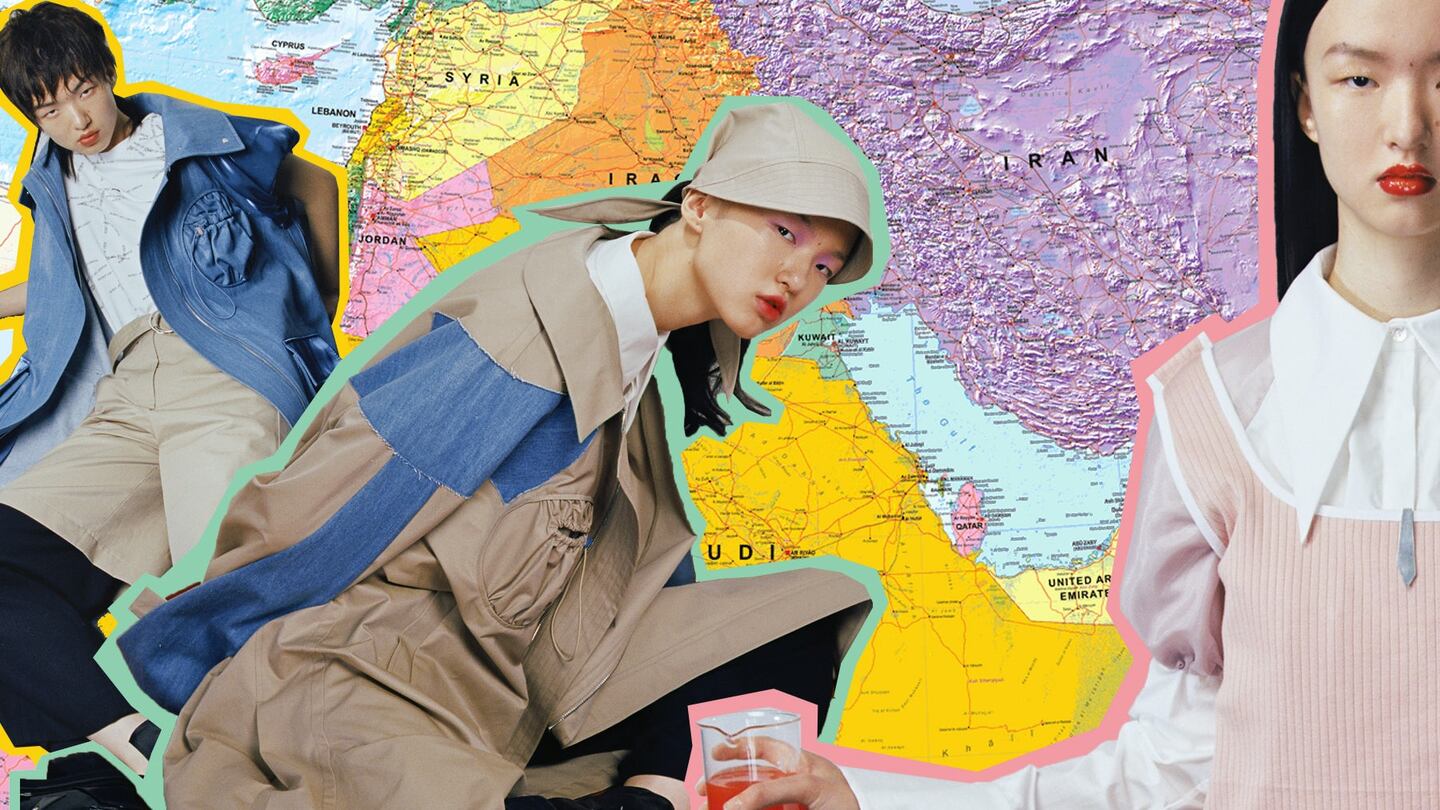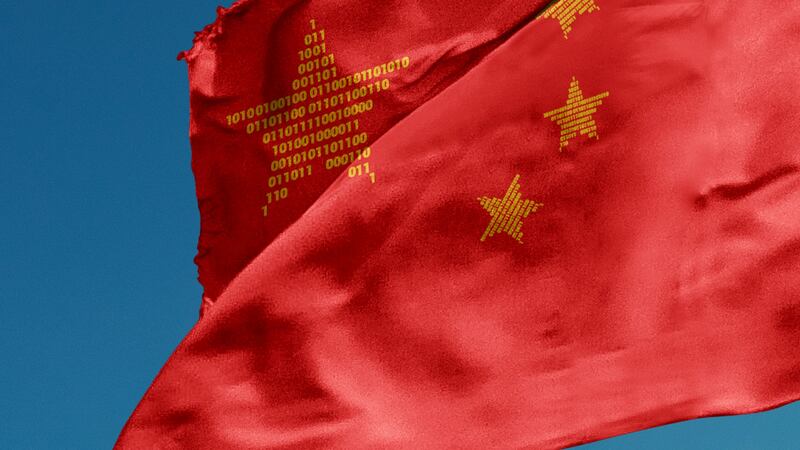
The Business of Fashion
Agenda-setting intelligence, analysis and advice for the global fashion community.

Agenda-setting intelligence, analysis and advice for the global fashion community.

Hello BoF Professionals, welcome to our latest members-only briefing. China’s colossal size and dynamism makes it a top priority for any global business, but it remains opaque to many in the fashion industry. Leveraging our rare access and local knowledge, the BoF China team demystifies the Chinese market with weekly industry analysis and the wider socio-cultural context you need to sharpen your focus.
DUBAI, United Arab Emirates — One cloudy day last week, a model clad in a rainbow-printed shirt and tangerine coat graced a runway held in Dubai's Design District (D3). The collection was by Thisnorthat, a brand from Shanghai that is a far cry from the lavish eveningwear and embellished creations that still dominate Dubai's fashion market.
Thisnorthat was one of 16 Chinese brands to showcase their collections at Arab Fashion Week, a series of shows, pop-ups and exhibitions organised by the Arab Fashion Council, and a tentative push to establish links between the fashion industries of United Arab Emirates (UAE) and China.
Arab Fashion Week is but one of many bets being placed on the UAE’s potential as a regional hub. Chinese investment in the Middle Eastern fashion market has been sporadic, but this season's event marks a turning point as two major stakeholders have a Chinese connection. Together, the Arab Fashion Council and JollyTrust in partnership with Hala China invested $6 million into the showcase that featured local and international brands.
ADVERTISEMENT
Organised by the Arab Fashion Council, the event forms part of the Dubai Fashion Days platform presented by Hala China, a joint initiative between Emirati conglomerates Meraas and Dubai Holding. Another big backer is Dubai Fashion Days’ strategic partner JollyChic, a mobile e-commerce player serving over a dozen markets in the Middle East and its periphery and the parent company of Jollytrust founded by Chinese nationals Aaron Li and David Ding.
The council aims to make Dubai a design hub, with China’s fashion capital as a guide. “Shanghai Fashion Week is already fairly well established, so we’ve been working hard to emulate the same standards,” Arab Fashion Council’s founder and chief executive Jacob Abrian tells BoF.
Such standards include fine-tuning show-goers and consumers’ experiences, a priority for China’s e-commerce players. Looks seen on Arab Fashion Week’s runways were immediately available for sale on both JollyChic and another local e-commerce site MarkaVIP, not unlike Alibaba-owned Tmall’s ‘see now, buy now’ model.
Shanghai Fashion Week is already fairly well established, so we've been working hard to emulate the same standards
“Though the Middle East has more cultural and customised needs, [the consumers in] China and the Middle East have the same understanding and perspective in luxury goods and fast fashion,” JollyChic’s co-founder and executive president David Ding tells BoF.
On the surface, Arab Fashion Week is a platform to introduce the likes of Thisnorthat to younger Middle Eastern clientele. “China’s influence on the UAE is more from the consumption of Chinese tourists, while local consumers are not so aware of Chinese designers” Ding tells BoF.
However, on a deeper level, the platform serves as a symbol of budding ties between China and the Middle East, which could see more Chinese investment directed into cities such as Dubai.
“Our strategic partnership with Hala China supports our efforts to strengthen the collaboration between the fashion industries in China and the UAE,” said Zhang Qinghui, chairman of China Fashion Association.
“In addition to facilitating cultural exchange, Dubai Fashion Days will provide the perfect opportunity for the two countries to present their designs, expertise, resources and creativity. We believe this can be the start of a long-term partnership that will create exposure across both markets and support their growth.”
ADVERTISEMENT
Much of Hala China's focus is placed on travel retail. “The inaugural edition of Dubai Fashion Days at City Walk and D3 aligns with Hala China’s strategy to develop ongoing events and explore opportunities in trade, tourism and investment,” explains chairman Sheikh Majid Al Mualla. It is important to note that both conglomerates that make up the Hala China joint venture count high-profile Dubai retail property developments as part of their portfolios.
Chinese consumers are already driving development in Dubai’s retail and tourism landscape. According to Dubai’s Department of Tourism and Commerce Marketing, the number of Chinese visitors visiting Dubai soared by 119 percent between 2014 and 2017, and China is Dubai’s fastest growing source market in the sector. A day before President Xi Jinping made his first visit to the UAE as China’s leader on July 19, Dubai-based Emaar Properties announced plans to build the region’s biggest Chinatown in the capital, featuring both Chinese and global fashion boutiques.
Both China and the Arab world have distinct commonalities, we share the ability to manufacture at scale and, we have the consumer with purchasing power.
Yet, fashion and tourism are only the tip of the iceberg, where China and the Middle East’s increasingly converging interests are concerned. President Xi’s introduction of the Belt and Road Initiative in 2013 — China’s strategic initiative to bridge Europe, Asia and Africa through investment — catalysed an outpouring of investment into the Middle East’s infrastructure, energy, tech and industrial sectors.
According to Sofya Bakhta, digital marketing manager at Shanghai-based firm Daxue Consulting, China was the biggest investor in the Arab markets with investments worth $26.9 billion as of 2016. Where McKinsey & Company expects trade between China and the Middle East to hit $500 billion by 2020, China's influence in the region shows no signs of waning.
"[Our] goals are far broader than fashion week. This is about establishing a solid culture alignment that is beneficial to both economies and our people," say Abrian, who before returning to Dubai presented Arab Fashion Week in Riyadh, Saudi Arabia in April.
“Both China and the Arab world have distinct commonalities, we share the ability to manufacture at scale and, we have the consumer with purchasing power. Several tier one cities in China, together with Dubai as a gateway for the Middle East region, provide excellent economic hubs for fashion trade, import and export.”
China’s interest in the UAE has grown beyond infrastructure and tech, into venture capital and e-commerce. Alibaba’s interest in the Middle East is being taken as a sign that the region’s digital and retail industries will see similar growth. To start, the Chinese e-commerce giant is looking to grow its cloud operations, after opening its first regional data centre in Dubai two years ago. Last year, Alibaba’s arch-rival JD.com announced that it was looking to partner with the Saudi government and enter the Middle East, citing the region as “the next new frontier.”
时尚与美容
FASHION & BEAUTY
ADVERTISEMENT

Burberry's Her fragrance campaign, shot by Juergen Teller | Source: Courtesy
Burberry Reportedly Eyeing Shanghai-London Stock Link
Following this month's publication of strong sales from Chinese consumers, the British luxury brand is looking to go the extra mile for growth in the east. China Daily reports that Burberry is planning to participate in a much-anticipated stock exchange scheme that will allow Chinese and British companies to list in each other's stock markets. The scheme, for which the China Securities Regulatory Commission published draft rules in early September, is expected to launch by early next month. Though the Chinese government has been vocal about opening its equity markets and welcoming foreign investment, analysts are interpreting the link between the two bourses as symbolic rather than substantial, and investors will only gain access to a limited number of shares through the new system. (BoF China)
Richemont’s Next Target: Chinese-owned Buccellati?
According to the Italian press, Richemont is looking to add to its portfolio of jewellery brands such as Cartier and Van Cleef & Arpels by acquiring Buccellati, though Chinese government restrictions are standing in the way. Buccellati is allegedly searching for a new buyer after its Chinese owner Gangsu Gangtai Holdings became unable to support the brand's expansion plans, which total € 200 million (around $226.8 million) and involve the opening of 88 boutiques. Due to Beijing's crackdown on funding for real estate firms, Gangtai may have to sell 99-year-old Italian high-end jeweller at a much lower price than the brand's € 230 million (around $260.8 million) valuation when its 85 percent stake was acquired in 2016. (Retail News Asia)
Sitoy Group Acquires A. Testoni
Hong Kong-based Sitoy Group Holdings Ltd. has purchased A. Testoni for €15 million ($ 17 million). Sitoy, which celebrates its 50th anniversary this year, is a high-end leather goods manufacturer and distributor and has invested in the likes of Kenneth Cole and Cole Haan. The Group is A. Testoni's current distribution partner for Greater China, and has announced plans to relaunch the Italian luxury footwear brand. Where China's menswear market has grown by over 200 billion yuan ($28.7 billion ) in the past five years, Sitoy will have to fight for its share of the market make an impression. (China Times)
Canada Goose Braves Fakes in China
Though China's Winter Olympics are three years away, Europe's winterwear giants are already eyeing gold. A market full of fake puffers is awaiting the Canadian parka maker, where Chinese lookalikes retail for a small fraction of their $1,550 price tag. Canada Goose's reputation has outpaced its own arrival in the market (having been worn by the likes of Jack Ma) and their jackets have become a status symbol, attracting strong demand and copycats proliferating online marketplaces such as Taobao. However, the brand is pushing ahead with expansion plans, and tasked with outpacing rivals such as Moncler — who already cites China for 40 percent of its sales worldwide — while bringing the brand to the attention of Chinese shoppers and fighting fakes. (Bloomberg)
科技与创新
TECH & INNOVATION
Xiaomi Redmi Note 6 Pro | Source: Xiaomi
Xiaomi Takes Over Meitu’s Smartphone Business
On November 19, Chinese smartphone giant Xiaomi announced its strategic partnership with Meitu, the Chinese tech company known for its beautifying selfie apps. The partnership will see Xiaomi —which beat an annual target of 100 million shipments two months early — take over Meitu's hardware business and access its smartphone-loving female audience, with Meitu receiving 10 percent of profits in return. With Meitu looking to focus on its software business, handing its hardware reigns to Xiaomi could give both companies a boost. With competitor Huawei embroiled in reports of a US ban, Xiaomi's European expansion is in the works, and launched in the UK a day before the Meitu announcement with the opening of its flagship store in London's Westfield mall. (Techcrunch)
The Silver Lining in US Tech Giants’ China Woes
Top US tech companies' efforts to storm through China's great firewall haven't been the most fruitful — just ask Google, Facebook, Amazon and Netflix, who face hurdles of government regulations restricting access to the country's now 800 million internet users, a figure released by China Internet Network Information Centre. The local market is also teeming with rivals such as Baidu ("China's Google"), Weibo ("China's Facebook"), Alibaba ("China's Amazon") and iQiyi ("China's Netflix"), all better equipped with the local know-how to attract Chinese netizens and mobile users to their platforms. However, Shira Ovide argues that US tech giants' lack of access to the Chinese market is a blessing in disguise, as China's stock market continues to hit its tech companies hard, from Alibaba's 31 percent share drop since June to rival e-commerce platform JD.com's halved value this year. Undeniably, American firms will be faced with pressure to tap into the Chinese population in the future and grow anxious as Beijing continues to fund homegrown start-ups to rival Silicon Valley, but a change of perspective could be refreshing as China's star players weather the storm. (Bloomberg)
Baidu-Owned iQiyi Partners with Google
iQiyi — the online video streaming platform under tech giant Baidu — announced on November 21 that it would be partnering with Google to incorporate the latter's digital rights management (DRM) technology into its own framework. The technology, named Google Widevine DRM, allows secure content distribution and is a film industry favourite in the field of intellectual property rights protection. Interestingly, Baidu, one third of China's tech trifecta, is commonly referred to as China's answer to Google, though iQiyi has long been in talks with Google and other global tech players to boost its platform. Considering Baidu owns a 93.3 percent stake in the video platform, the move is intriguing — in recent months, Baidu has one-upped Google with the launch of its new AI translation tool, and the latter has debuted Google Discover, an explore page resembling Baidu's own layout. (Marketwatch)
消费与零售
CONSUMER & RETAIL

JD.com's automated logistics and warehouse complex in Gu'an, China | Source: Getty
The Cost of JD.com’s Singles Day Sales? Illegal Student Labour
Everything comes at a cost, especially when $23 billion is at stake. According to the Financial Times, JD.com's recent Singles Day sales success meant a plethora of labour law violations for student workers, some of whom worked 12 to 16 hour shifts well below minimum wage and were threatened with being barred from graduation. A student from Shandong alleges that he was paid $2 per hour at JD.com — China's second largest e-commerce platform — and that it was "not possible not to do the internship," while two students say they worked extended 18-hour shifts, though their college claims that all students involved did overtime voluntarily. A spokesperson for JD.com stated that some temporary workers may not have been treated according to standards, and that the company is taking action to investigate the situation. (Financial Times)
Duty Free to Fuel China’s Consumption Boost
On November 21, Beijing announced that Chinese shoppers will be able to spend 30 percent more on tariff-free imports starting January 1. Amid a consumption slowdown and in keeping President Xi's promise to boost imports, the government's cap on cross-border e-commerce purchases for individuals will rise by 6,000 yuan ($863.5), with tax-free limits on single transactions extending 150 percent to 5,000 yuan ($719.6), and 63 in-demand products added to the tariff-free list. The move is likely to push domestic demand for high-end products as more goods fall within the single transaction limit, and with Beijing continuing its clampdown on daigou agents in the coming year, Bain & Company estimates that half of China's consumers will purchase their luxury goods in the country. However, whether the allure of duty-free can offset an underlying consumption slowdown still remains to be seen. (SCMP)
A Brief History of the Foreign Brand Faux Pas
Last week's uproar against Dolce & Gabbana was not the first time that a western brand has felt the wrath of Chinese consumers. In April, Balenciaga was the subject of a brief boycott when netizens cried racial discrimination for the rough handling of Chinese shoppers at the brand's Printemps concession in Paris, Dior was criticised last year for appointing controversial celebrity Angelababy as its first Chinese brand ambassador, and Japanese beauty brand Pola received backlash for banning Chinese shoppers from entering its local store in the same year. Tarte captioned an Instagram post with the "Potato, potato, ching chong tomato" in 2017, and Phillip Plein set off sparks two years later when local news platforms unearthed an archived T-shirt emblazoned with the phrase "F*** You China." Its high time that foreign brands take note and re-examine their approach to Asian markets, and the ball is in their court. (SCMP)
政治,经济与社会
POLITICS, ECONOMY, SOCIETY

Chinese technology flag | Photo by BoF
Taiwan’s President Resigns, Beijing Censors Pro-Independence Acceptance Speech
The 55th annual Golden Horse Awards held on November 18 made a turn for the political when local director Fu Yue expressed hopes for Taiwan's independence from China during her acceptance speech for best documentary, during which live coverage was censored on Chinese media. "I hope that our country will be recognised and treated as an independent entity one day," Fu said, and further reports by Taiwanese media claim that Beijing has banned Chinese stars from participating in next year's awards. Six days later, Taiwan's pro-independence president Tsai Ingwen resigned as the head of the Democratic Progressive Party after a defeat in local elections. Though Tsai will serve for the remainder of her term, to many the blow means a turning point in the island's tenuous relationship with Beijing. (The Guardian)
Beijing’s New Social Credit System Blocks 11 Million from Buying Flights
Chinese nationals have been barred from booking flights and trains as the government rolls out its 'social credit' programme, which will be fully implemented by 2020. The system was detailed in a plan published on November 19, and will assess the 'trustworthiness' of individuals and enterprises according to their activities and purchases, from donating blood and volunteering to purchasing large amounts of alcohol and violating traffic and non-smoking laws. According to The Global Times, Beijing has barred 11.14 million and 4.25 million from travelling by air and train respectively, and may also choose to slow internet connectivity, reduce access to schools and jobs for individuals or family members, blocking booking rights at hotels and waiving individuals' rights to own pets. (Epoch Times)
Clothing, Textiles and Electronics in Crosshairs for Trump Tariffs
Though President Trump has refrained from implementing tariffs for consumer goods such as smartphones, laptops, and clothing, the situation is likely to change if his trade talks with President Xi at this week's G20 Summit don't see the US and China coming to a resolution. $2.5 billion worth of cotton sweaters and pullovers will be hit if the trade war escalates and Trump follows through on his tariff threats, as will $44.5 billion worth of phones. On November 26, Trump repeated his threat and stated that he is "highly unlikely" to hold off on increasing tariffs on $200 billion worth of Chinese goods from 10 percent to 25 percent, adding that tariffs of 10 or 25 percent would be added to the remaining $267 billion. (Bloomberg)
China Decoded wants to hear from you. Send tips, suggestions, complaints and compliments to our Shanghai-based Asia Correspondent casey.hall@businessoffashion.com.
Related Articles:
[ Dolce & Gabbana: Cultural Stupidity Can Be CostlyOpens in new window ]
[ China Says US-China Trade Talks Should Be Equal, Mutually BeneficialOpens in new window ]
[ Luxury Brands Need to Invest in Chinese TeensOpens in new window ]
[ Forget Luxury, Cheap Clothes Mean Big Money in ChinaOpens in new window ]
With consumers tightening their belts in China, the battle between global fast fashion brands and local high street giants has intensified.
Investors are bracing for a steep slowdown in luxury sales when luxury companies report their first quarter results, reflecting lacklustre Chinese demand.
The French beauty giant’s two latest deals are part of a wider M&A push by global players to capture a larger slice of the China market, targeting buzzy high-end brands that offer products with distinctive Chinese elements.
Post-Covid spend by US tourists in Europe has surged past 2019 levels. Chinese travellers, by contrast, have largely favoured domestic and regional destinations like Hong Kong, Singapore and Japan.